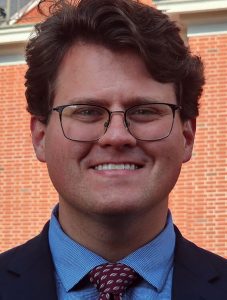I assumed I misheard her due to the loud A/C unit in my office.
“What?”
“I’m being called to another church, Caleb.”
As the fall air finally cools down a scorching Midwest summer, I still wonder if this memory is a fever dream. After all, I had just moved to Columbia, dragging my uprooted wife and two dogs along the way, to learn under great pastors at a great church.

Caleb Cooke
My name is Caleb Cooke and I am the pastoral resident at First Baptist Church in Columbia, Mo. You might know Columbia as the home of Mizzou, but many CBF folks also know this town is where Carol and Michael McEntyre serve as pastors. After all, that’s all I knew about the town when I moved here.
Or that’s what I thought I knew about the town.
It’s hard to keep secrets in CBF life, and it’s even harder not to know what’s going on, so you probably already know Carol McEntyre has been called to serve First Baptist Church in Greenville, S.C. As I told her when she shared the news with me, “This is such an exciting opportunity.” (Sure, this was the only thing I could get out, but I meant it nonetheless.)
My unconvincing smile and nod didn’t do a great job of hiding my inner thoughts: It was time to get out of Dodge.
“I’ll just do something else,” I thought. “I don’t owe this church anything.” Leaving would be easy, after all, since I hadn’t really been around long enough to form any loyalties to anyone except the Hy-Vee greeter.
That was until a few hours later. What was supposed to be a nice dinner with a friendly couple in the congregation turned into a crisis care experience. We weren’t even able to get our waters before someone I hardly knew had to be wheeled into an ambulance as his wife watched. Five hours of prayer and reassurance in the emergency room preceded a midnight Wendy’s meal.
Wouldn’t you be excited for a life in pastoral ministry, too? This was my first crisis care experience, funny enough, and it came at the lowest point of my life in Columbia. (It was my wife’s, too. No, she’s not in the ministry.) At the time, I considered this the tragedy of pastoral ministry, that if you do it well, it’s hard not to develop loyalties.
Nevertheless, when I had a moment to think the next morning, I finally had a chance to tell myself these weren’t the terms I had agreed to. These weren’t the terms I wanted. I felt hopeless. I still wanted to leave and chase God’s blessing since it obviously wasn’t here. I felt like God couldn’t bless me with the training necessary to be a good pastor without the terms I agreed to.
“I felt like God couldn’t bless me with the training necessary to be a good pastor without the terms I agreed to.”
Since then, I have found meaning in the character of Jacob in the book of Genesis. I read Jacob’s story as telling us God continues to bless us despite our own ideas of what God’s blessing should be.
Jacob is blessed by God from before his birth to rule over his brother (Genesis 25). However, Jacob spends his entire life grasping for God’s blessing on his own terms. As he leaves his mother’s womb, he is grasping the heel of his brother, a Hebrew idiom that denotes deceit or trickery. (Jacob’s name may mean “trickster.”)
Jacob continues using his trickery to secure God’s blessing on his own terms by exploiting his hungry brother to exchange his birthright for some stew. Then comes the story everyone recognizes. Jacob, in a plot to steal his father Isaac’s blessing from his brother Esau, pulls a devious trick on his father to impersonate Esau. After putting on his brother’s clothes and covering his arms with lamb’s hair, Jacob receives the blessing from his father that promises prosperity and power over his brother.
To me, Jacob’s story isn’t as much about where he ended up; it’s much more about how he got there. In a way, I’ve found the story of Jacob to be useful for me to describe my call. I always have held a certain inclination toward reading Scripture, especially the New Testament. During my first year of college, after I had begun distancing myself from my childhood religion, I found out I could read the New Testament for a living without being a pastor.
“That’s perfect,” I thought. I could read Scripture on my own terms and decide whatever I wanted to do with it. This must be what God wants for me since God blessed me with an inclination toward Scripture. I bullheaded my way down the path of academia and didn’t look back.
This worked well for a while — until I caught myself applying to seminaries. No need to worry, though, since I had an explanation that, once again, reestablished my terms: “No, I don’t want to be a pastor, and I could really go without all this God stuff, but the divinity school has good faculty, and an M.Div. will give me another year to prepare my application for doctorate programs.”
I shrugged off any comment from anyone that placed me in a ministry setting. Whenever I was told, “You would be a good pastor, Caleb,” I thought, “I’ll be an even better professor.”
I’d like to think my grasp for God’s blessing on my own terms took a more honest form than Jacob’s trickery, but maybe I am supposed to see that I was tricking myself. After I finally pivoted away from a career in the academy for a variety of reasons, I grasped again for God’s blessing on my own terms. I convinced myself I needed to do something else, I needed time away from church and church-adjacent settings. I switched to a master of theological studies degree so I could get out of seminary faster. After a nearly guaranteed opportunity in higher education administration didn’t work out, I finally let myself sit still and think for one second.
“When you’re running from a call, sitting still and thinking is the most dangerous thing you can do.”
But when you’re running from a call, sitting still and thinking is the most dangerous thing you can do. Sitting still and thinking doesn’t give you the space to trick yourself; it doesn’t give you the hustle and bustle to distract your mind. Much to the contrary, when you sit still and think, things fall into your lap so fitting that you can’t really trick yourself any longer.
“It’s a two- to three-year program for seminary graduates to learn under a local pastor. They look like the real deal, and the church seems like a good fit, so I’m considering applying,” I told my wife, who didn’t realize she married a pastor.
“I’ve never even thought about the state of Missouri, much less about moving there,” she said.
“The deadline passed last week,” I reassured her. “I doubt they’ll even consider my application.”
After a few interviews and a lovely on-site visit, I finally felt like I was receiving God’s blessing and living it out. I wasn’t running from anything — I was just living.
Maybe this is how Jacob felt in the chapters after he grasped for his father’s blessing on his own terms. Maybe Jacob thought his history had nothing to do with his present because he finally had arrived at what he presumed was God’s blessing. Now all he had to do was live into it.
But Jacob could not have imagined the struggle that came next. In a literal wrestling match with God, all night long God and Jacob trade blows with one another until God strikes Jacob on the hip and pops it out of its socket. Finally, God wants to leave the encounter but Jacob, as always, grasps for God’s blessing one more time: “I will not let you go unless you bless me.”
Personally, I think Jacob’s last grasp for a blessing says, “You have not blessed me to this point, and you’re not blessing me now, so do it already.” Maybe Jacob sought more of a blessing or a more specific blessing he had in mind. Maybe Jacob thought he had lost his blessing because God was wrestling him.
I sure did. I assumed I was living out God’s blessing on my life only to receive what felt like a piledriver when I learned my would-be mentor was leaving. I felt God had promised me a certain blessing I agreed to, a blessing that looked the way I wanted it to.
But Scripture says a blessing looking different than we had planned does not mean we have lost that blessing. Scripture tells us blessings come on God’s terms, not ours, and these terms might include a wrestling match with God.
Before Jacob limps away, he decides to name the mountain where he wrestled God “Peniel,” which means “face of God.” The sun rose upon him as he left this holy place battered and bruised, but also blessed.
So, yes, I am a pastoral resident and my senior pastor is leaving, and yes, it feels like God just punched me in the hip. I am so tired of wrestling with God and, like Jacob, begging God to bless me like I want to be blessed.
But I know the morning will come, and I know I will leave this place having seen the face of God.
Caleb Cooke, a native of Mount Airy, N.C., serves as pastoral resident at First Baptist of Columbia, Mo. He earned bachelor’s and master’s degree at Duke University.


